Middle East
Children among several killed in Israel’s attacks on Gaza amid aid blockade | Israel-Palestine conflict News
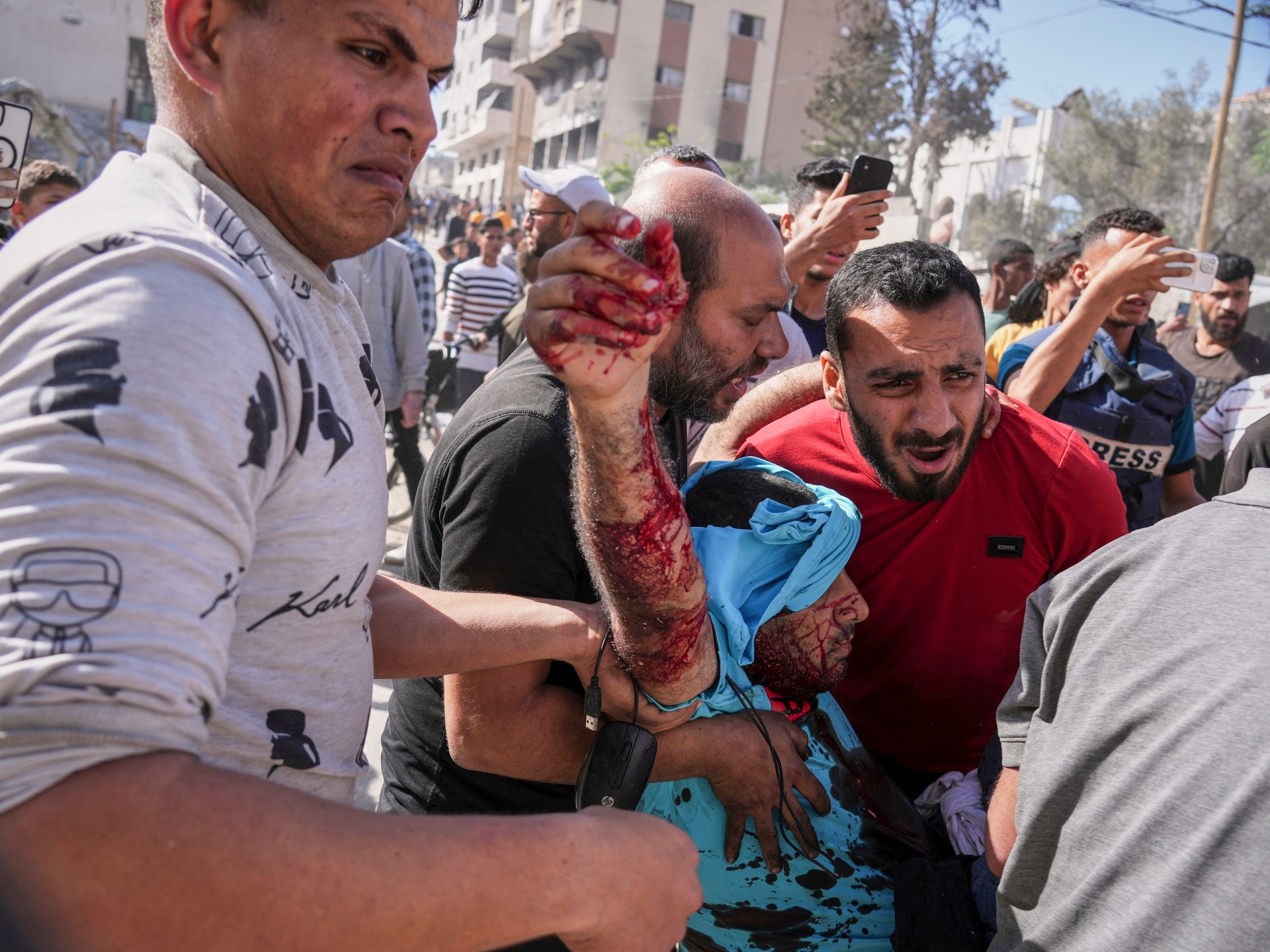
Seven people, including three children, have been killed in Israeli attacks on the Gaza Strip amid a months-long Israeli blockade that has deepened the humanitarian crisis in the war-torn coastal enclave.
Palestinian news agency Wafa said Israeli warplanes bombed a tent in the Sabra neighbourhood of Gaza City on Saturday morning, killing five members of the Tlaib family.
“Three children, their mother and her husband were sleeping inside a tent and were bombed by an [Israeli] occupation aircraft,” family member Omar Abu al-Kass told the AFP news agency.
The strikes came “without warning and without having done anything wrong”, added Abu al-Kass, who said he was the children’s maternal grandfather.
In parallel, a drone attack on Gaza City’s Tuffah neighbourhood left one person dead.
Further south, Wafa said Israeli gunboats opened “heavy fire” on the shores of Rafah, killing a man identified as Mohammed Saeed al-Bardawil. Two more civilians were injured in an attack on the al-Mawasi humanitarian zone, west of Rafah.
In the past 24 hours, at least 23 Palestinians have been killed and 124 others injured in Israeli attacks across the Gaza Strip, according to the enclave’s Health Ministry.
Israeli blockade
The attacks came amid Israel’s continuing refusal to allow vital supplies into Gaza since March 2, leaving the enclave’s 2.3 million residents dependent on a dwindling number of charity kitchens, which have been shutting down in recent days as food runs out.
Reporting from Deir el-Balah in central Gaza, Al Jazeera’s Hind Khoudary said: “There’s barely food … We’re talking about bakeries not operating, we’re talking about zero distribution points and we’re talking about only a few hot meal kitchens still operating.”
Khoudary said people queueing for hours would often leave empty-handed, with remaining kitchens stretching out food that would previously have fed 100 to serve up to 2,000 people.
“We’re seeing more people dying, we’re seeing more children dying due to malnutrition and the lack of food. But it’s not only the lack of food, it’s also the lack of medical supplies, it’s the lack of fuel, cooking gas and it’s the lack of everything,” she said.
Among the charities shuttering operations, the United States-based World Central Kitchen said on Wednesday that it had been forced to close down because it no longer had supplies to bake bread or cook meals.
The United Nations’ Office for the Coordination of Humanitarian Affairs appealed for the blockade to be lifted.
“Children are starving, and dying. Community kitchens are shutting down. Clean water is running out,” it said on Friday in a post on X.
‘Failure of humanity’
The blockade is also having a devastating effect on people with chronic illnesses, depriving Palestinians who suffer from diabetes, cancer and rare conditions, of life-saving medication.
Reporting from Gaza City, Al Jazeera’s Hani Mahmoud said: “Doctors here say the tragedy is not in what’s happening, but in what is preventable.”
“These diseases have a treatment, but people of Gaza no longer have access to them, and they say that this is not just a failure of logistics, but of humanity,” he added.
Mahmoud spoke to the father of a 10-year-old boy suffering from diabetes, who said insulin was not available across northern Gaza.
“I spend entire days searching pharmacies, hoping to find it. Sometimes we hear that individuals might have it, so I go to their homes to barter,” he said.
Said al-Soudy, head of emergency in the oncology department of Gaza City’s Al Helou International Hospital, told Al Jazeera: “A large part of patients are struggling to find their essential medications. Without them, their health conditions deteriorate and may become life-threatening.”
Pharmacist Rana Alsamak told Al Jazeera that Palestinians were unable to obtain medication for “multiple sclerosis, rheumatoid arthritis, hepatitis, chronic illnesses and … immune-related diseases”.
“These conditions now go largely untreated,” she said.
On Friday, the United States said it was establishing the Gaza Humanitarian Foundation to coordinate aid deliveries into Gaza, with Israel providing military security for operations. The United Nations rejected the move, saying it would weaponise aid, violate principles of neutrality and cause mass displacement.
Middle East
At least 33 people killed in suspected RSF attacks in Sudan | Sudan war News
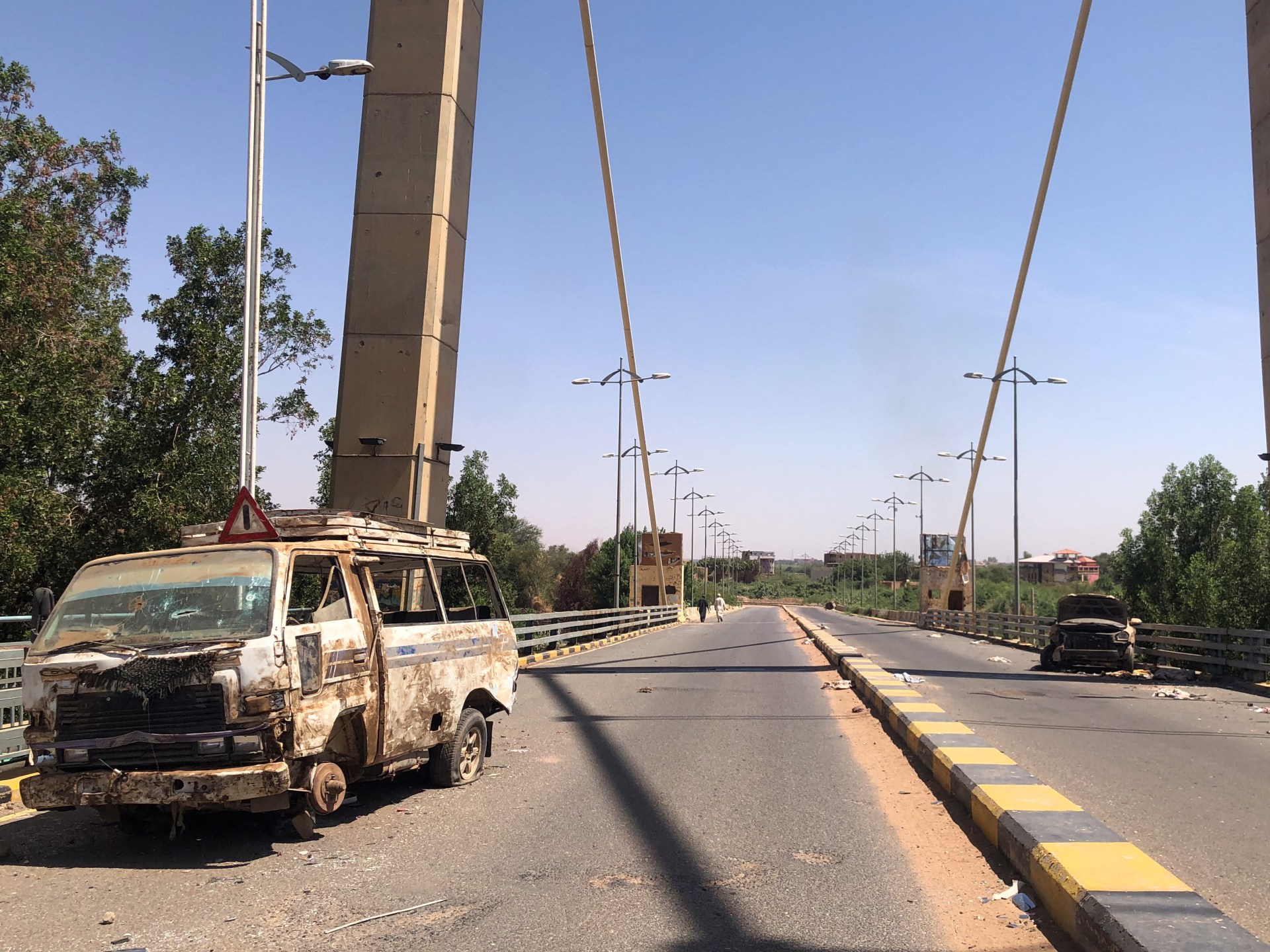
The paramilitary force has been blamed for attacks on a prison in el-Obeid and a displacement camp in Darfur.
At least 33 people have been killed in Sudan in attacks suspected to have been carried out by the paramilitary Rapid Support Forces (RSF) as the brutal two-year war claims its latest victims.
An RSF strike on a prison on Saturday in el-Obeid killed at least 19 people, while on Friday evening, at least 14 members of the same family were killed in an air attack in Darfur, local sources said.
The attacks – part of the RSF’s ongoing war with the military-led government’s Sudanese Armed Forces (SAF) since 2023 – came after six straight days of the paramilitary group’s drone attacks on the army-led government’s wartime capital of Port Sudan.
These attacks damaged key infrastructure, including a power grid and the country’s last operational civilian airport, which was a key gateway for aid into the war-ravaged nation.
The war has left tens of thousands dead, displaced 13 million people and triggered what the United Nations calls the world’s worst humanitarian crisis.
The attack on the prison on Saturday also wounded 45 people, a medical source told the AFP news agency. The source said the jail in the army-controlled city in the North Kordofan state capital was hit by an RSF drone.
The night before, 14 people were killed at the Abu Shouk displacement camp near el-Fasher in Darfur, a rescue group said, blaming the paramilitary.
The camp “was the target of intense bombardment by the Rapid Support Forces on Friday evening”, said the group of volunteer aid workers.
The camp near el-Fasher, the last state capital in Darfur still out of the RSF’s control, is plagued by famine, according to the UN.
It is home to tens of thousands of people who fled the violence of successive conflicts in Darfur and the conflict that has been ripping Africa’s third-largest country asunder since 2023.
The RSF has shelled the camp several times in recent weeks.
Abu Shouk is located near the Zamzam camp, which the RSF seized in April after a devastating offensive that virtually emptied it.
RSF escalation
Elsewhere on Saturday, SAF warplanes struck RSF positions in the Darfur cities of Nyala and el-Geneina, destroying arms depots and military equipment, a military source told AFP.
The RSF has recently said it had taken the strategic town of al-Nahud in West Kordofan, a key army supply line to Darfur.
The RSF’s escalation in Port Sudan earlier this month came after the military struck the Nyala airport in South Darfur, where the RSF receives foreign military assistance, including drones. Local media stated that dozens of RSF officers were killed in the attack.
Sudan’s army-aligned authorities accuse the United Arab Emirates of supplying those drones to the RSF, which has no air force of its own.
The war began as a power struggle between SAF chief Abdel Fattah al-Burhan and his former deputy, RSF commander Mohamed Hamdan Dagalo. It has effectively divided the country into two, with the army controlling the north, east and centre, while the RSF and its allies dominate nearly all of Darfur in the west and parts of the south.
Both sides have been accused of committing war crimes.
Middle East
Iraq look to former Australia coach Arnold to boost 2026 World Cup hopes | Football News
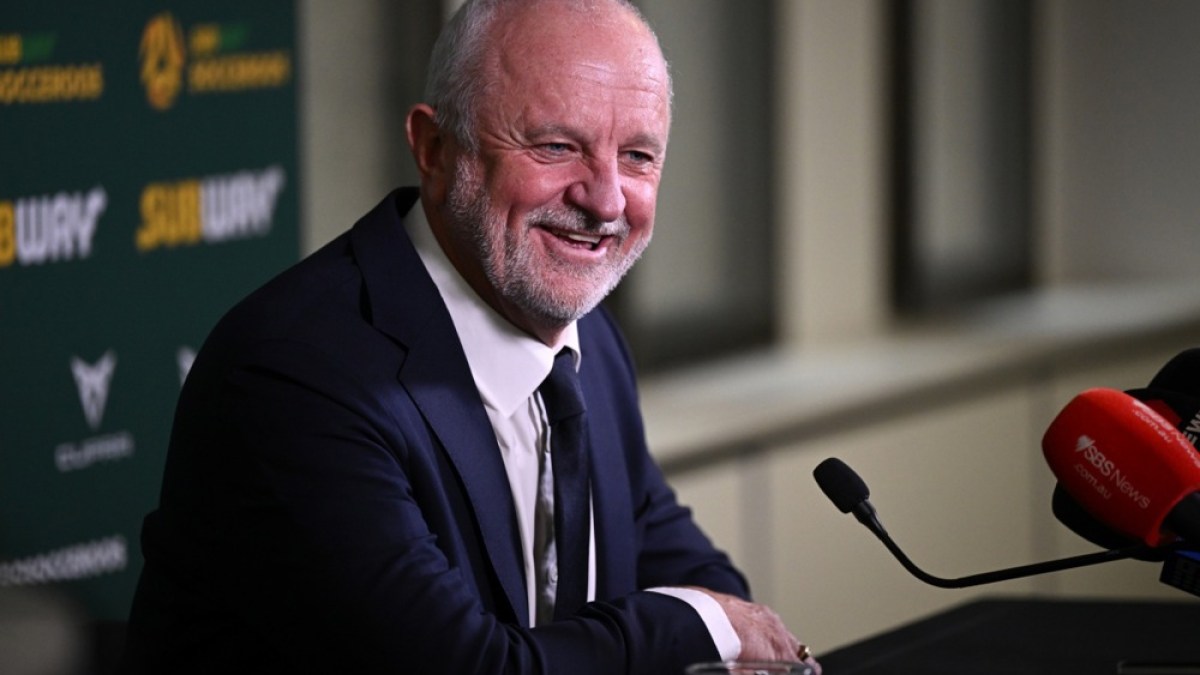
Iraq replaces Jesus Casas as head coach with former Australia boss Graham Arnold ahead of crunch World Cup qualifiers.
Former Australia manager Graham Arnold has been confirmed as the new head coach of Iraq by the country’s football federation ahead of next month’s World Cup qualifiers against South Korea and Jordan.
Arnold’s appointment was announced on social media by the Iraq Football Association, which published photographs of the 61-year-old being welcomed in Baghdad by officials from the national body.
“We are delighted to announce Graham Arnold as the new head coach of the Iraq national team,” the federation said in a post on Instagram. “Welcome to the Lions of Mesopotamia!”
Arnold replaces Jesus Casas at the helm after the Spaniard’s departure in the wake of a 2-1 loss to Palestine in March during the third round of Asia’s qualifiers for the 2026 World Cup.
That result left the Iraqis in third place in the standings in Group B, four points adrift of leaders South Korea and one behind the Jordanians.
Welcome to Baghdad ✔️
Our new Australian head coach Graham Arnold has arrived in the Iraqi capital! 🛬 pic.twitter.com/AH1IybroHv
— Iraq National Team (@IraqNT_EN) May 9, 2025
The top two finishers in each of Asia’s three qualifying groups advance automatically to the World Cup, while the teams in third and fourth place progress to another round of preliminaries.
Arnold’s first game in charge will be in Basra on June 5 against the South Koreans before he takes his new team to Amman to face Jordan five days later. Iraq are attempting to qualify for the World Cup for the first time since 1986.
The appointment sees Arnold return to international management more than seven months after standing down as Australia’s head coach.
Arnold, who led the Australians to the knockout rounds of the 2022 World Cup during a six-year spell in charge, quit after an uninspired start to the current phase of qualifying when his side lost to Bahrain and drew with Indonesia in September.
He was replaced by Tony Popovic, the former Western Sydney Wanderers coach who has taken the Socceroos to second place in Group C of Asia’s qualifiers ahead of games against already qualified Japan and Saudi Arabia in June.
Middle East
Netanyahu’s war choices fuel discord in Israel over captives’ fate in Gaza | Israel-Palestine conflict News
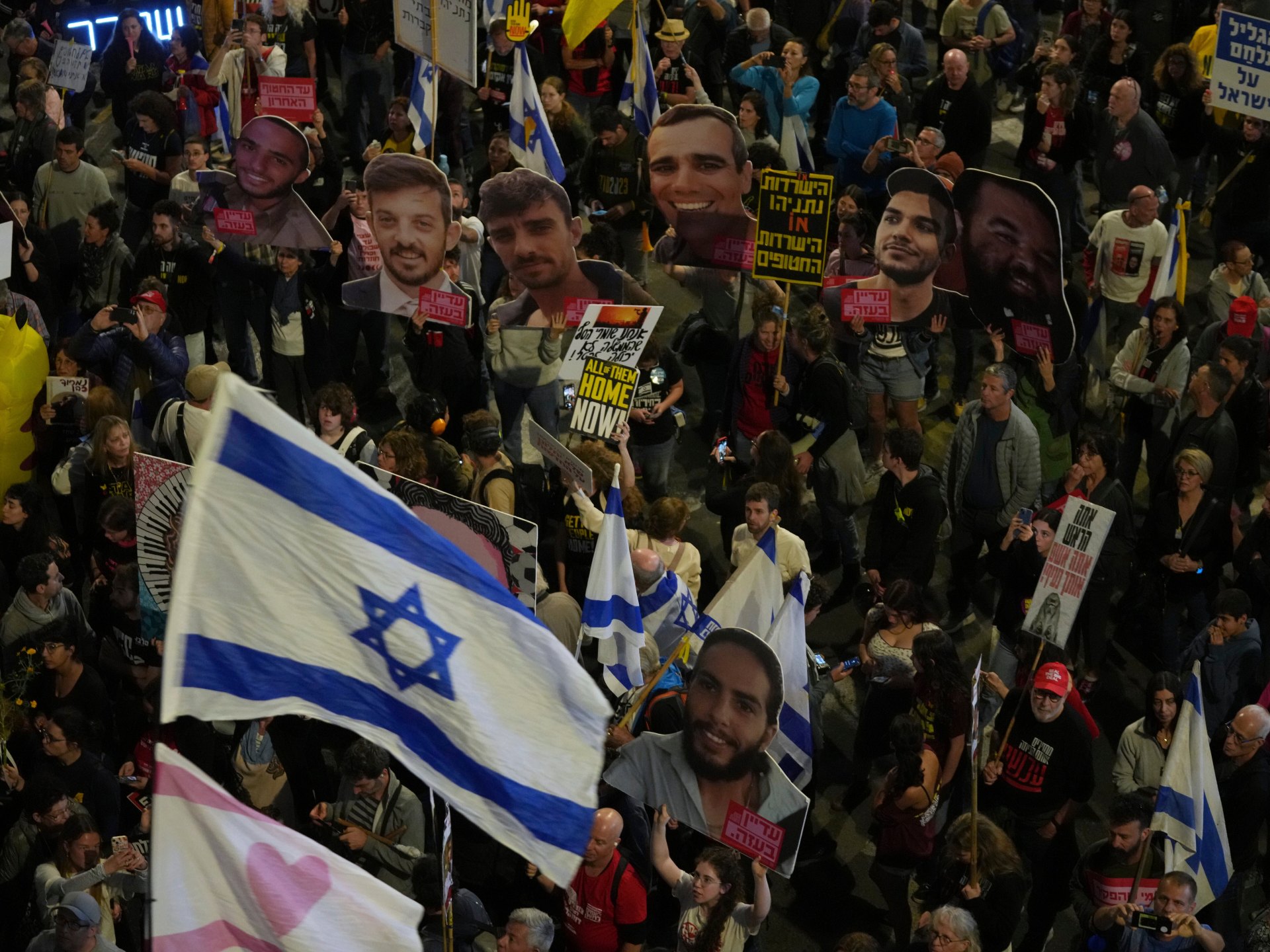
To prioritise the release of the captives in Gaza, or to continue fighting what critics are calling Prime Minister Benjamin Netanyahu’s “forever war” – that is the question increasingly dividing Israel.
Israel’s government, laser-focused on the idea of a total victory against Hamas in Gaza, appears to be opting for the latter.
And that is only increasing the criticism Netanyahu has received since October 2023, firstly for his government’s failure to stop the October 7 attack, and then for failing to end a now 19-month war, or provide a clear vision for what the “day after” in Gaza will look like.
Netanyahu’s decision in March to unilaterally end a ceasefire instead of continuing with an agreement that would have brought home the remaining captives has widened the cracks within Israeli society, as opponents realised that the likelihood of the captives leaving Gaza alive was becoming more remote.
In recent weeks, a wave of open letter writing from within military units has emerged protesting the government’s priorities.
The discontent has also gained traction with the public. Earlier this month, thousands of Israelis gathered outside the Ministry of Defence in Tel Aviv to protest against Netanyahu’s decision to call up a further 60,000 reservists as part of his escalation against the bombed out and besieged Palestinian enclave of Gaza, where his forces have already killed more than 52,000 Palestinians, many of them women and children.
In mid-April, current and former members of the air force, considered one of Israel’s elite units, also released a letter, claiming the war served the “political and personal interests” of Netanyahu, “and not security ones”.
Prompted by the air force, similar protests came from members of the navy, elite units within the military and Israel’s foreign security agency, Mossad.
Political and personal interests
Accusations that Netanyahu is manipulating the war for his own personal ends predate the breaking of the ceasefire.
In the minds of his critics, the longer the war continues, the longer Netanyahu feels he can defend himself against the numerous threats to his position and even his freedom.
In addition to facing trial on numerous counts of corruption dating back to 2019, he also faces calls to hold an inquiry into the government’s political failings before the October 7 attack.
Netanyahu also faces accusations that members of his office have allegedly been taking payment from Qatar – the Gulf state has previously dismissed the allegations as a “smear campaign” intended to hinder efforts to mediate an end to the conflict.
The continuation of the war allows Netanyahu to distract from those issues, while maintaining a coalition with far-right parties who have made it clear that any end to the war without total victory – which increasingly appears to include the ethnic cleansing of Gaza – would result in their departure from government, and Netanyahu’s likely fall.
And so there are questions about whether Netanyahu’s announcement of a further escalation in Gaza, including the occupation of territory and displacement of its population, will mark an end to the conflict, or simply bog Israel down in the kind of forever war that has so far been to Netanyahu’s benefit.
‘I don’t know if they’re capable of occupying the territory,” former US Special Forces commander, Colonel Seth Krummrich of international security firm Global Guardian told Al Jazeera, “Gaza is just going to soak up people, and that’s before you even think about guarding northern Israel, confronting Iran or guarding the Israeli street,” he said, warning of the potential shortfall in reservists.
“It’s also competing with a tide of growing [domestic] toxicity. When soldiers don’t return home, or don’t go, that’s going to tear at the fabric of Israeli society. It plays out at every dinner table.”
Staying at home
Israeli media reports suggest that part of that toxicity is playing out in the number of reservists simply not showing up for duty.
The majority of those refusing service are thought to be “grey refusers”. That is, reservists with no ideological objection to the mass killings in Gaza, but rather ones exhausted by repeated tours, away from their families and jobs to support a war with no clear end.
Official numbers of reservists refusing duty are unknown. However, in mid-March, the Israeli national broadcaster, Kan, ran a report disputing official numbers, which claimed that more than 80 percent of those called up for duty had attended, suggesting that the actual figure was closer to 60 percent.
“There has been a steady increase in refusal among reservists,” a spokesperson for the organisation New Profile, which supports people refusing enlistment, said. “However, we often see sharp spikes in response to specific shifts in Israeli government policy, such as the violation of the most recent ceasefire or public statements by officials indicating that the primary objective of the military campaign is no longer the return of hostages and ‘destruction of Hamas’, as initially claimed, but rather the occupation of Gaza, and its ethnic cleansing.”
Also unaddressed is growing public discontent over the ultra-religious Haredi community, whose eight-decade exemption from military service was deemed illegal by the Supreme Court in June of last year.
Despite the shortfall in reservists reporting for duty and others having experienced repeated deployments, in April, the Supreme Court requested an explanation from Netanyahu – who relies upon Haredi support to maintain his coalition – as to why its ruling had not been fully implemented or enforced.
Throughout the war, Netanyahu’s escalations, while often resisted by the captives’ families and their allies, have been cheered on and encouraged by his allies among the far-right, many of whom claim a biblical right to the homes and land of Palestinians.
The apparent conflict between the welfare of the captives and the “total victory” promised by Netanyahu has run almost as long as the conflict itself, with each moment of division seemingly strengthening the prime minister’s position through the critical support of the ultranationalist elements of his cabinet.
Netanyahu’s position has led to conflict with politicians, including his own former Defence Minister Yoav Gallant. While Gallant wasn’t opposed to the war in principle – his active support for Netanyahu eventually led to him joining Netanyahu in facing an arrest warrant from the International Criminal Court for war crimes – his prioritisation of the captives put him at odds with the prime minister.
The divide over priorities has meant that civility between the government and the captives’ families has increasingly gone out the window, with Netanyahu generally avoiding meeting families with loved ones still captive in Gaza, and far-right politicians engaging in shouting matches with them during meetings in parliament.
Division within Israeli society was not new, Professor Yossi Mekelberg of Chatham House told Al Jazeera, “but wars and conflicts deepen them”.
“Now we have a situation where some people have served anywhere up to 400 days in the army [as reservists], while others are refusing to serve at all and exploiting their political power within the coalition to do so,” Mekelberg added.
“Elsewhere, there are ministers on the extreme right talking about ‘sacrificing’ the hostages for military gain,” something Mekelberg said many regarded as running counter to much of the founding principles of the country and the Jewish faith.
“There’s such toxicity in public discourse,” Mekelberg continued, “We see toxicity against anyone who criticises the war or the prime minister, division between the secular and the religious, and then even divisions within the religious movements.”
-

 Middle East2 days ago
Middle East2 days agoKey takeaways: Documentary names alleged killer of Al Jazeera’s Abu Akleh | Crime News
-
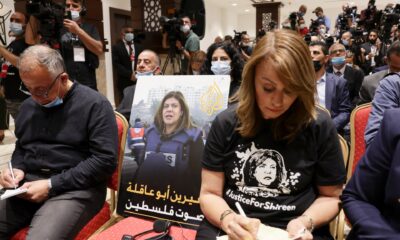
 Middle East2 days ago
Middle East2 days agoDocumentary sheds light on Biden’s reactions to Shireen Abu Akleh’s killing | Occupied West Bank News
-
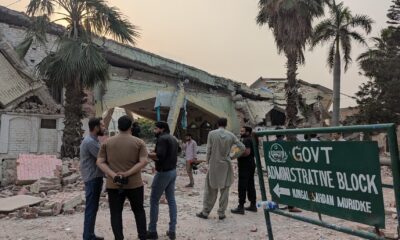
 Conflict Zones2 days ago
Conflict Zones2 days agoInside Muridke: Did India hit a ‘terror base’ or a mosque? | India-Pakistan Tensions
-

 Conflict Zones1 day ago
Conflict Zones1 day ago‘Missiles in skies’: Panic in Indian frontier cities as war clouds gather | India-Pakistan Tensions News
-

 Lifestyle1 day ago
Lifestyle1 day agoKids author Mo Willems and The Pigeon stare down the future in a new book
-

 Lifestyle2 days ago
Lifestyle2 days agoTransgender troops being moved out of the military under new Pentagon order
-

 Europe1 day ago
Europe1 day agoPope Leo XIV urges cardinals to make themselves ‘small’ in first mass as pontiff
-
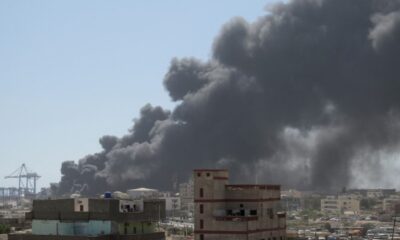
 Middle East1 day ago
Middle East1 day agoUAE denies supplying Sudan paramilitaries with Chinese arms | Sudan war News




